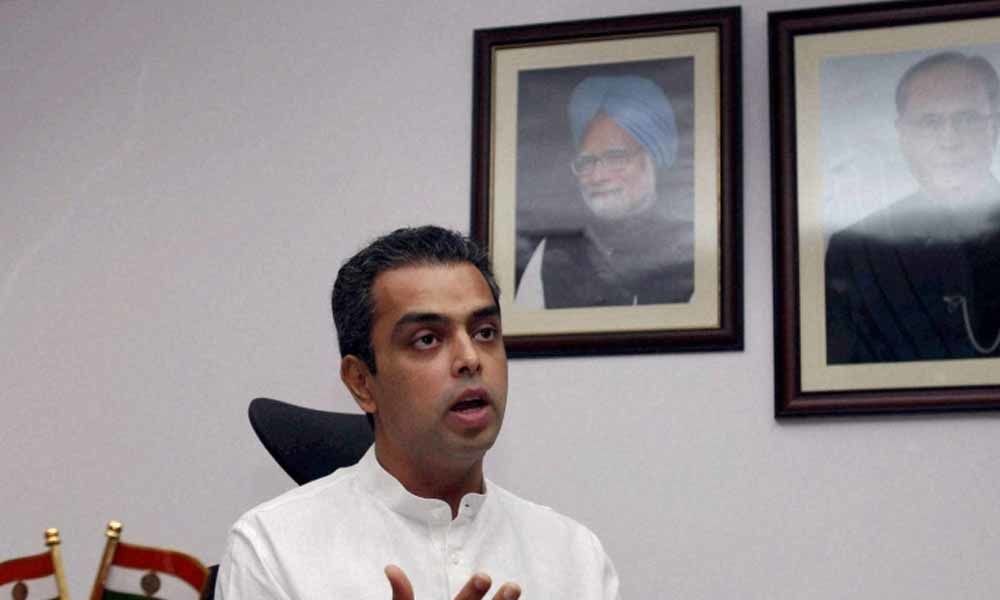Live
- Allu Arjun's Family Appearance on Unstoppable with NBK Breaks Viewership Records
- Unity of hearts & minds essential for peace & progress, says J&K Lt Governor
- IPL 2025 Auction: I deserve Rs 18 cr price, says Chahal on being acquired by Punjab Kings
- EAM Jaishankar inaugurates new premises of Indian embassy in Rome
- Sailing vessel INSV Tarini embarks on second leg of expedition to New Zealand
- Over 15,000 people affected by rain-related disasters in Sri Lanka
- IPL 2025 Auction: RCB acquire Hazlewood for Rs 12.50 cr; Gujarat Titans bag Prasidh Krishna at Rs 9.5 crore
- Maharashtra result reflects the outcome of Congress' destructive politics: BJP's Shazia Ilmi
- 13 killed, 18 injured as landslides, flash floods hit Indonesia's North Sumatra province
- Israeli PM seeks additional delay of testimony in court for criminal trial
Just In

The Mumbai Congress chief also said being in continuous election mode is a roadblock to good governance and distracts politicians from addressing real issues.
MUMBAI: Mumbai Congress president Milind Deora Wednesday appeared to be supporting the idea of holding simultaneous polls in the country and called for a debate on the issue.
He said being in continuous election mode is a roadblock to good governance and distracts politicians from addressing real issues.
Terming 'one nation, one election' an "important and valuable reform", he said the government should decide on it by taking all political parties on board and seeking opinions of the intelligentsia, organisations working on electoral reforms and students.
Prime Minister Narendra Modi Wednesday discussed with heads of various political parties, which have at least one MP either in the Lok Sabha or Rajya Sabha, the issue of "one nation, one election".
"It is unfortunate that India's political class, which I am a part of, is fast forgetting the art of debate, discussion and engagement. This, in my opinion, is a grave threat to India's democratic nature," Deora said in a statement.
He said he is yet to come across evidence, which suggests that if elections to the state assemblies are held simultaneously with the Lok Sabha polls, it will help the party that is in power nationally.
"Only recently, along with the Lok Sabha elections, the states of Arunachal Pradesh, Odisha and Andhra Pradesh elected members to their respective Vidhan Sabhas.
Two out of the three states elected parties that are not even in an alliance with the BJP," he said.
India's 70-year electoral journey has taught us that the Indian voter is aware, informed and can differentiate between state and central elections.
Our democracy is neither fragile nor immature and the debate of one nation - one poll calls for an open mind on either side of the spectrum, Deora said.
"We must not forget that until 1967, India conducted simultaneous polls," he added.
"As a former MP and someone who has contested four elections, I believe that being in continuous election mode is a roadblock to good governance, distracts politicians from addressing real issues and adds populism to the character of governance, which is not necessarily a long-term solution to some of the gravest problems Indians face," the former Union minister said.
However, the argument about elections straining our exchequer is uncalled for as we should be ready to keep our democracy thriving at any cost.
India needs to outline a singular agenda for its social and economic growth, he said.
The scepticism of political parties should not be ridiculed, instead, the government must continue to attempt to build consensus, Deora said, adding that it must also refrain from seeking to implement such an important and valuable reform without taking all parties on board.
This is not an ordinary reform as it will have a long-lasting impact on politics and governance.
The government should also invite Indian intelligentsia, academics, organisations working on electoral reforms and students to collectively provide their perspectives on this issue, he said.
In the last few years, we have seen partisan politics dictating matters that critically impact our democracy.
This lack of bipartisanship is hurting India's prospects and preventing it from freeing itself from the clutches of archaic precedents and systems, According to the Congress leader, in India, bold ideas rarely get bipartisan support.
"BJP paid a price for opposing the Civilian Nuclear Agreement. Similarly, I am confident that friends in the opposition will show pragmatism, objectivity and farsightedness when dealing with this issue," he said.

© 2024 Hyderabad Media House Limited/The Hans India. All rights reserved. Powered by hocalwire.com







